Press Releases
2023 World Environment Day | Beat Plastic Pollution
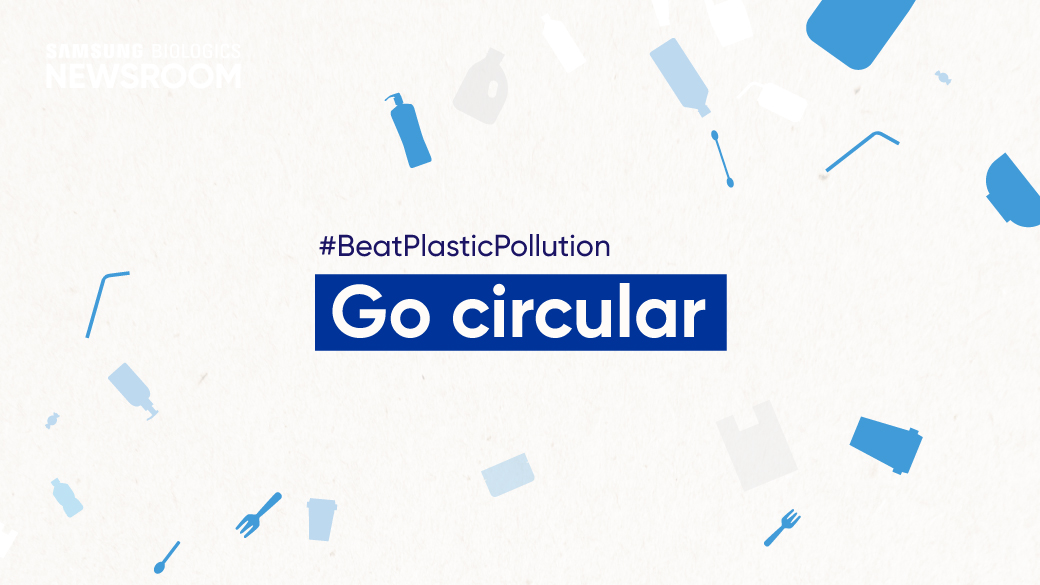
“Of the seven billion tonnes of plastic waste generated globally so far, less than 10% has been recycled.”
– United Nations Environment Programme*
Plastic pollution is one of the biggest, most urgent threats facing our planet. According to a recent United Nations Environment Programme report, the way we produce, use and dispose of plastics is polluting ecosystems, creating risks for human and animal health and destabilizing the climate.1 Making an impact has always been our company’s top priority and we’re investing in innovation to facilitate recycling and replace plastic products with more sustainable alternatives. To mark this year’s World Environment Day, we interviewed our employees to discuss how they are working to deliver a more circular lifestyle to #BeatPlasticPollution.
“Through our SuperBin program, Samsung makes recycling easy and accessible to employees.”
As a Lead Scientist in the Analytical Tech Transfer Group, Wonseok Song cares about environmental issues such as renewable energy and recycling. He also knows that while most plastic items never fully disappear - ending up as microplastics in aquatic ecosystems and even in the human body - we can take steps to circulate plastic in the economy by reusing and recycling. He is aware of microplastic pollution that causes tremendous harm to human health and affects marine life. “Thanks to the SuperBins* installed in our company, it has become much easier to implement sustainable practices, such as recycling, into our daily lives,” said WonSeok.
*SuperBin is a waste recycling system that recycles plastic waste into reusable materials.
“While plastics are still prevalent in lab testing, we’re managing plastic waste more efficiently by reducing errors in our procedures.”
Dagyeom Kang, a scientist in the Downstream Development Group, strives to incorporate circular actions in the lab by preventing unnecessary waste and disposing of used plastics properly. She emphasized that the team has incorporated strict GMP procedures to ensure that they’re using resources sustainably without generating excess waste.
“Even in our marketing and event materials, we’re constantly looking for ways to replace plastics with sustainable alternatives.”
For this year’s BIO International conference, Seoyoon Cheong, a Senior Specialist in the Marketing Group, designed an eco-friendly booth that replaced plastic materials with sustainable alternatives such as wood and cloth.
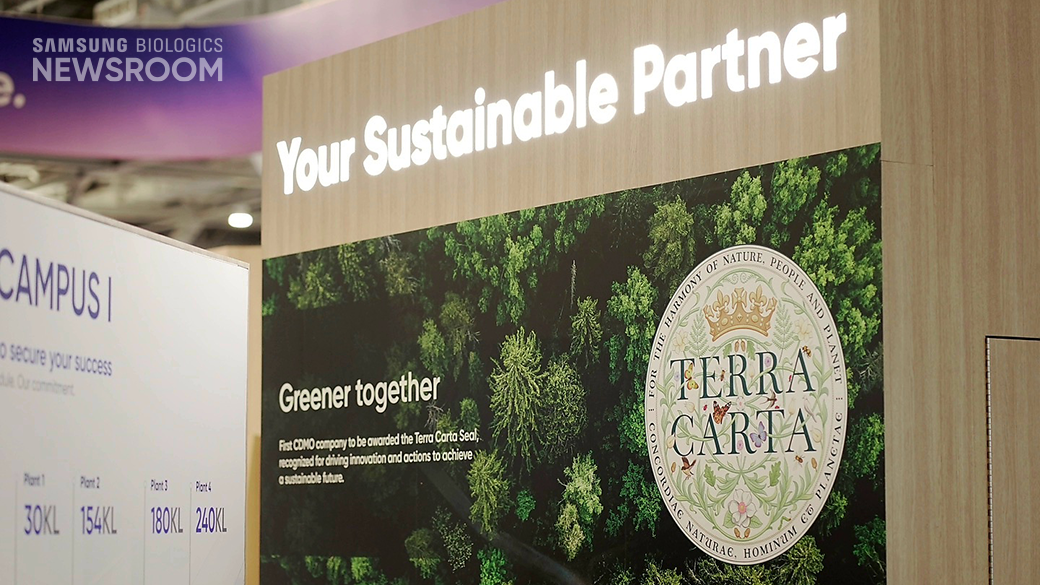
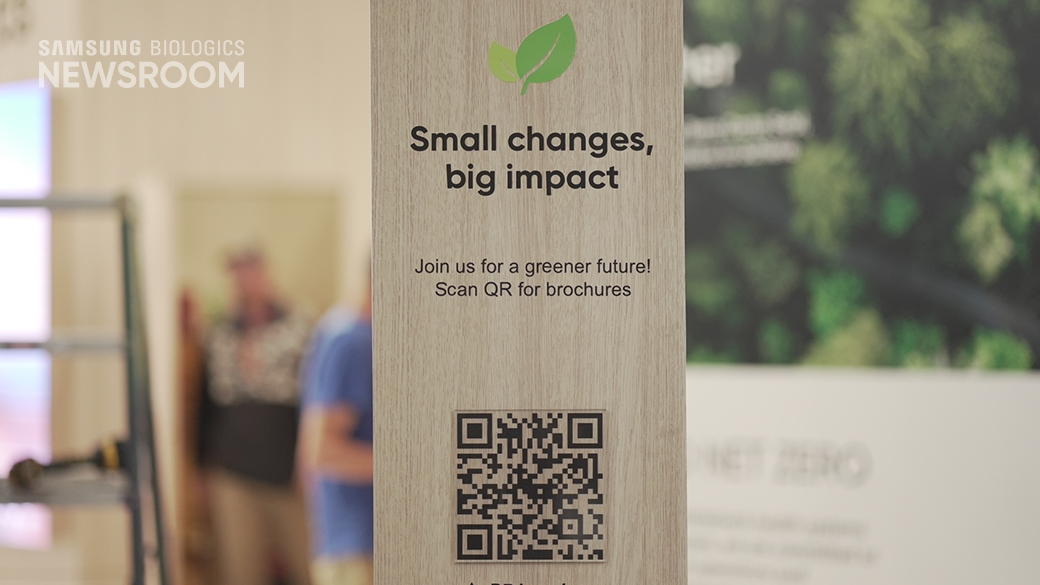
Greener Together!

Samsung Biologics aspires to lead the industry in protecting our planet for the health of future generations. As part of our mission to build a more sustainable future for all, we are committed to achieving zero greenhouse gas (GHG) emissions and 100% renewable energy across our sites by 2050 or earlier.
*United Nations Environment Programme. (2023 May 16). Turning off the Tap: How the world can end plastic pollution and create a circular economy.
https://www.unep.org/resources/turning-off-tap-end-plastic-pollution-create-circular-economy
Related Contents

“Of the seven billion tonnes of plastic waste generated globally so far, less than 10% has been recycled.”
– United Nations Environment Programme*
Plastic pollution is one of the biggest, most urgent threats facing our planet. According to a recent United Nations Environment Programme report, the way we produce, use and dispose of plastics is polluting ecosystems, creating risks for human and animal health and destabilizing the climate.1 Making an impact has always been our company’s top priority and we’re investing in innovation to facilitate recycling and replace plastic products with more sustainable alternatives. To mark this year’s World Environment Day, we interviewed our employees to discuss how they are working to deliver a more circular lifestyle to #BeatPlasticPollution.
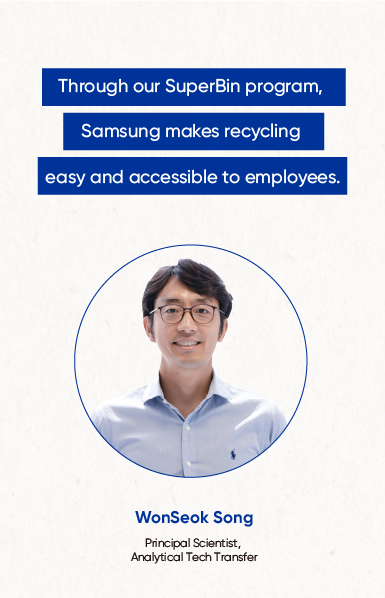
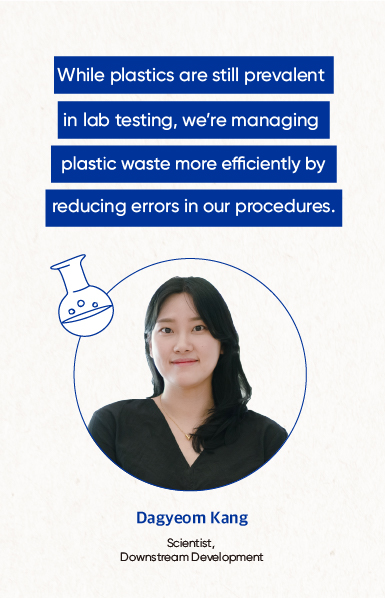
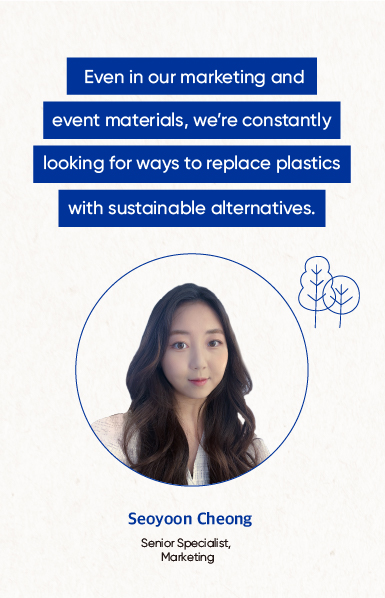
“Through our SuperBin program, Samsung makes recycling easy and accessible to employees.”
As a Lead Scientist in the Analytical Tech Transfer Group, Wonseok Song cares about environmental issues such as renewable energy and recycling. He also knows that while most plastic items never fully disappear - ending up as microplastics in aquatic ecosystems and even in the human body - we can take steps to circulate plastic in the economy by reusing and recycling. He is aware of microplastic pollution that causes tremendous harm to human health and affects marine life. “Thanks to the SuperBins* installed in our company, it has become much easier to implement sustainable practices, such as recycling, into our daily lives,” said WonSeok.
*SuperBin is a waste recycling system that recycles plastic waste into reusable materials.
“While plastics are still prevalent in lab testing, we’re managing plastic waste more efficiently by reducing errors in our procedures.”
Dagyeom Kang, a scientist in the Downstream Development Group, strives to incorporate circular actions in the lab by preventing unnecessary waste and disposing of used plastics properly. She emphasized that the team has incorporated strict GMP procedures to ensure that they’re using resources sustainably without generating excess waste.
“Even in our marketing and event materials, we’re constantly looking for ways to replace plastics with sustainable alternatives.”
For this year’s BIO International conference, Seoyoon Cheong, a Senior Specialist in the Marketing Group, designed an eco-friendly booth that replaced plastic materials with sustainable alternatives such as wood and cloth.


Greener Together!

Samsung Biologics aspires to lead the industry in protecting our planet for the health of future generations. As part of our mission to build a more sustainable future for all, we are committed to achieving zero greenhouse gas (GHG) emissions and 100% renewable energy across our sites by 2050 or earlier.
*United Nations Environment Programme. (2023 May 16). Turning off the Tap: How the world can end plastic pollution and create a circular economy.
https://www.unep.org/resources/turning-off-tap-end-plastic-pollution-create-circular-economy
Related Contents